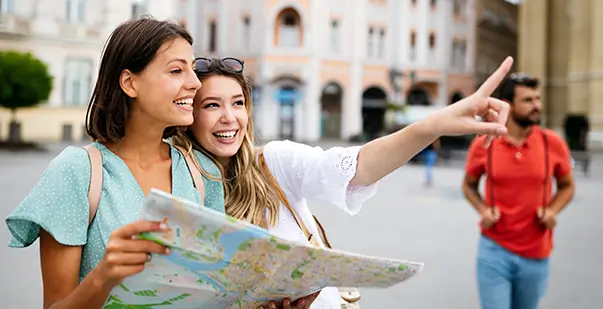Tour guides are responsible for the safety and well-being of their guests. Every guide must take life-saving courses and keep their certifications updated. A tour guide’s CPR, first aid course lets them explore resuscitation and rescue breaths as well. This blog discusses the importance of a tour guide during medical emergencies. You will also learn why guides must keep their life-saving certifications updated.
Master ACLS Now
Get ACLS certified with confidence
Role of tour guides as first responders during emergencies.
Tour guides can play a vital role as first responders during emergencies. They are crucial in situations where tourists or visitors might require immediate assistance. Here’s how tour guides can help during emergencies:
- Immediate Assistance: Tour guides are often on the scene when emergencies occur. They can provide immediate help by assessing the situation and offering initial aid.
- Communication: Tour guides can quickly call for professional medical help. Their knowledge of local languages and communication channels can be invaluable.
- Calm Presence: Tour guides are familiar faces to tourists and keep people calm. Their ability to remain composed can have a positive impact.
- Evacuation: Tour guides know the area well and can guide tourists to safe locations in case of natural disasters or other emergencies.
- Basic First Aid: Tour guides often have training in basic first aid and CPR. They can provide initial medical assistance until professional medical help arrives.
- Local Knowledge: Tour guides know the area’s geography, landmarks, and the nearest medical facilities. This information is crucial in emergencies when time is of the essence.
- Contacting Families: During emergencies, tourists might need to get in touch with their families or the embassy. Tour guides can assist in arranging these communications and providing support.
- Emergency Plans: Some tour guides are trained to handle emergencies as part of their job. They can help by explaining emergency plans.
- Assisting Vulnerable Individuals: Tour guides can provide extra care to elderly individuals during emergencies.
Recognizing the challenges of touring in remote areas and the need for tour guides to have medical skills
Traveling to remote areas can be exciting but also comes with challenges. Tour guides play an essential role, and having medical skills can make a big difference. Here’s why:
- Limited Medical Help: In remote areas, hospitals and doctors might be far away. Tour guides with medical skills can provide help when someone gets sick or hurt.
- Long Travel Times: It might take a long time to reach a hospital. Tour guides can give first aid quickly, which is essential in emergencies.
- Language Barriers: People in remote areas might not speak the same language. A tour guide with medical skills can communicate better and help get the proper care.
- Unfamiliar Surroundings: Remote places, like wild animals or tricky terrain, might have different dangers. A skilled tour guide can keep everyone safe.
- Self-Reliance: Remote areas might not have easy access to supplies. Guides can use their medical skills to make do with what’s available.
- Unexpected Situations: Remote areas can have unexpected challenges. A guide with medical skills can adapt and handle surprises.
- Better Preparation: Tour guides who know first aid and more can plan trips more safely, considering potential health risks.
- Helping Locals: Sometimes, remote areas have locals needing medical help. A skilled guide can assist tourists and people in the area.
Read More: Online BLS certification course
Importance of obtaining and maintaining valid certification
Getting and keeping a good first aid certification is essential for tour guides. Here’s why:
- Safety First: Tour guides take care of people during trips. Knowing first aid means they can help if someone gets hurt or sick.
- Quick Help: In an emergency, a certified guide can give fast help. It can make a big difference and keep things from getting worse.
- Tourists’ Trust: Tourists feel safer with guides who know first aid. They trust that the guides can handle any unexpected situations.
- Confidence Boost: Guides with first aid training feel more confident in handling challenging situations. It helps them stay calm and make better choices.
- Positive Reputation: When tourists have a safe and enjoyable trip, they tell others. It boosts the guide’s reputation and brings more business.
- Being Responsible: Guides with first aid skills are responsible leaders. They show tourists that their well-being is a top priority.
- Legal Requirements: In some places, having first aid certification is a rule for being a tour guide. It keeps guides and tourists protected by the law.
Conclusion
Tour guides, as first responders, are the backbone of any trip. They are meant to make your experience of traveling to a new place entertaining and safe. Having knowledge of the hidden gems and safety protocols is a part of their job. However, with their busy schedules, they often have less time to upskill. A tour guide’s CPR and first aid knowledge must be spot on always and for this, there are many online life-saving courses available. The CPR Online Certification platform offers life-saving courses for everyone. So log onto our website take a look at the group discounts offered, and enroll now.







